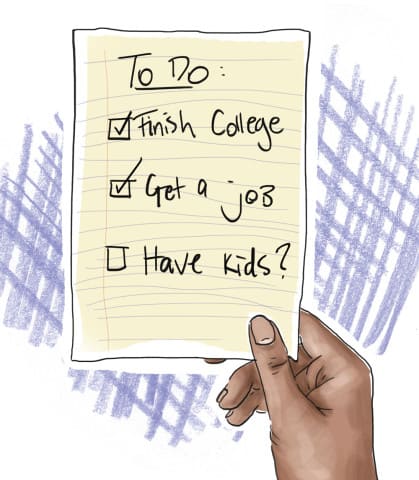MONICA GORDON
 At some point we’ve all heard the iconic to-do list for a supposedly successful life: go to college, get a good job, get married and have kids.
At some point we’ve all heard the iconic to-do list for a supposedly successful life: go to college, get a good job, get married and have kids.
As a society, we’ve grown to the point where we’re recognizing that sometimes trade school is a better option than university, sometimes a career you actually enjoy is more important than a job with prestige and that even marriage isn’t for everyone.
But what about having kids? It’s still a default life event but — like the others — it doesn’t necessarily have to be.
Voluntary childlessness is an idea that deserves more consideration than the average person gives it. There are plenty of compelling reasons to not become a parent. You have the time to focus on your career, the resources and freedom to travel the world and the ability to live a life that you find personally fulfilling — whatever that may look like.
Any parent will tell you that raising kids is a huge undertaking that requires a lot of time and energy — it isn’t all sunshine and butterflies. Children are messy, require loads of attention and supervision and can have poor emotional control, resulting in ear-splitting tantrums. While hissy fits are more limited to younger children, one thing stays consistent: raising children is extremely time-consuming.
Due to this, you can say goodbye to your independence, freedom, social life and possibly even your sleep schedule. On top of that, kids are a huge financial drain; some estimates suggest it can cost nearly $250,000 to raise one child to adulthood. This isn’t including paying for college or any other money you may spend on them after they turn 18.
Now some people will be completely unconcerned when presented with these facts. For these individuals, the trials that come with raising kids are worth it, because being a parent is something they really want.
However, not everyone feels this way. Some people can read a list like the one above and find the idea of having kids rather off-putting. If the list of responsibilities makes you hesitant in any way, take a moment and for the sake of a simple thought experiment, consider the idea of not having kids.
Despite having kids being a very common choice, there’s no longer any reason to see it as an inevitable life decision. Advancements in contraceptive technology make it completely possible to live your entire life without conceiving a child. With the global population at seven billion and rising, we certainly aren’t under any obligation to reproduce. Given the negative effects that bad parenting can have on society, why do we still act as if we are obligated to reproduce? Are there widespread social benefits that we could be missing out on?
Parenting’s continued default status is made obvious by one of the more common rebuttals to saying you don’t want kids, aka the classic, “You’ll change your mind.” It’s a statement that’s immediately dismissive. Of course you’ll change your mind — you’re just going through a phase right now. Now, this won’t dissuade those who feel very strongly about not having kids, but what about those who are ambivalent?
I have a couple friends who, when discussing their plans for the future, will list off their career goals but when prompted about children their mood will dampen and they will sound concerned as to where they will fit kids in. The thing is, they don’t talk about it as something they’re looking forward to or even as something they want to do. It sounds as if they’re discussing something they have to do at some point and they aren’t sure when the optimal time to get it out of the way is.
Removing the default status from having kids could also have another benefit. Perhaps some of the strongest evidence that being a parent isn’t for everyone is the continued existence of abusive and neglectful parents. They are permanent sources of pain for those who have lived through a childhood under parental tyranny or disinterest. While it would be naive to posit that normalizing a child-free lifestyle would completely eradicate the problem, it probably would help.
We know that children who are the result of unintentional pregnancies are more likely to be abused or neglected and that these same kids are also more likely to engage in criminal activities as adults. While this data is specifically for accidental pregnancies, anyone with an abusive or neglectful parent can tell you that you don’t have to be unplanned to feel unwanted. While some parents may plan to have children, that doesn’t protect them from the damage caused by the resentment of the parent, either directly or indirectly.
Ultimately, it’s in our best interest to remove the pressure to have kids from those who are ambivalent about it. Letting an individual live a fulfilling life that doesn’t happen to include kids is preferable to that person becoming an unhappy, burnt-out parent whose contribution to society now includes several maladjusted children.
If parenting was seen only as the pursuit of those who enthusiastically wanted kids and who were emotionally and financially prepared for them, wouldn’t society as a whole derive nothing but benefit from that?
—
Graphic: Stephanie Mah/Graphics Editor
Leave a Reply